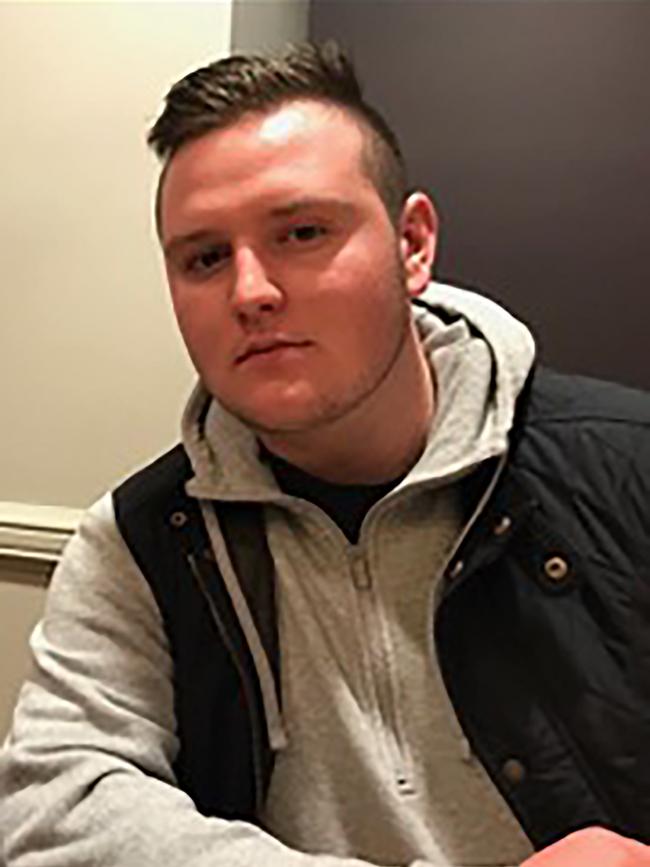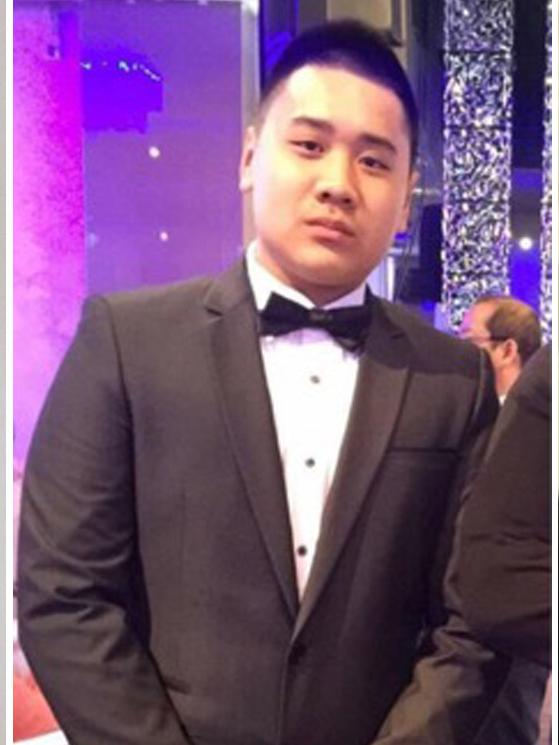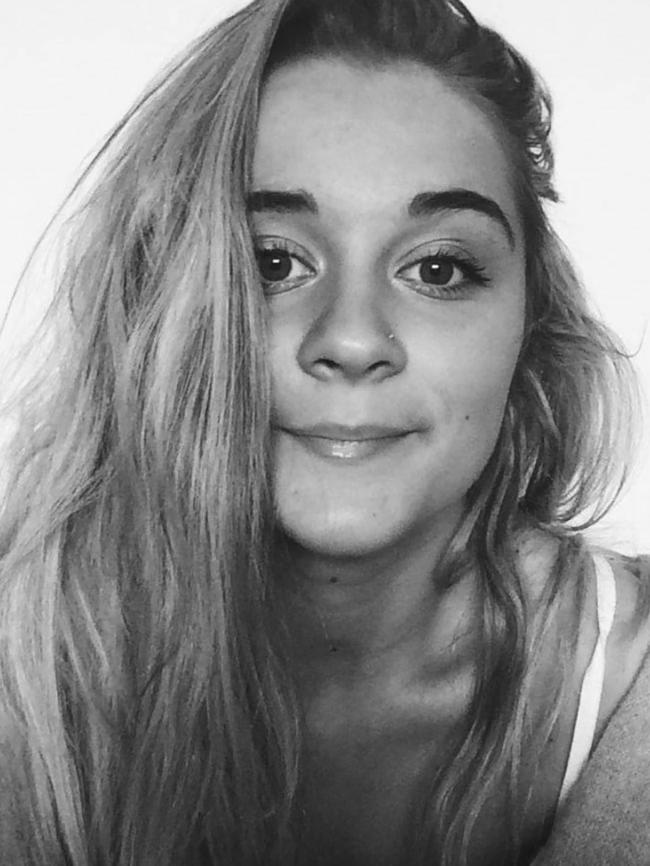Dancing with death
Hearing the last moments of their children’s lives at music festivals is a new hell for parents.

CALLUM BROSNAN, 19
“That’s my boy they are talking about, it’s distressing, each moment of the day,” Cornelius Brosnan almost whispers to himself. “I have funny dreams. I keep thinking, in my head, I can bring him back.”
It has been yet another scarring day of evidence about the final, terrifying moments of his 19-year-old son, Callum, after a fatal overdose from the party drug MDMA. His spiral into confusion, then agony and final collapse, all laid bare before the NSW Coroners Court.
Callum’s death is one of six MDMA fatalities at NSW dance music festivals being investigated by NSW deputy state coroner Harriet Grahame. Nathan Tran, 18; Diana Nguyen, 21; Joseph Pham, 23; Joshua Tam, 22; and Alexandra Ross-King, 19 — all died from MDMA toxicity or complications of MDMA use, five of them last summer.
But for the parents of the dead, even the most excruciating evidence of their children’s last hours on earth does not come close to the grief they live with every day.
Seven months on, Brosnan says his only relief is in dreams. It’s the one place he can pretend, just for a moment, Callum is still with him. His gifted son. The boy who had won a place at the Sydney Conservatorium and wanted, more than anything, to be a film score composer.
He tortures himself with the thought that somehow he could have stopped his son’s death, protected him from himself.
“I wonder what I could have done differently, as a father. It’s hard to let go,” Brosnan says.
His son’s 21-year-old best mate, whose name has been suppressed, gave a devastating account of Callum’s last day when he’d teamed up with 13 other friends for the Knockout Games of Destiny at the Sydney Showground on December 8.

The inquest heard Callum had taken at least nine capsules of MDMA “pingers” over five hours. But after a night of non-stop “dancing and singing”, his mate noticed Callum was suddenly “just standing there, looking blank and staring at the stage”.
It was about 11.30pm. The friend told the inquest he’d asked Callum if he wanted to take a break or go get some help at the festival’s medical tent, but the 19-year-old had refused, insisting: “I’ll just push through it.”
“He said he was just going to keep a strong mind … he thought he would get through it by staying calm,” the friend said.
The inquest heard Callum’s condition quickly deteriorated as he and his friends walked from the festival with other revellers to Sydney Olympic Park train station.
By the time they got there, about 12.30am, Callum was “stumbling” and talking incoherently to “random” strangers. He then collapsed on the train platform, his eyes rolling back and flickering as he slipped in and out of consciousness.
An ambulance officer who tried to treat him on the platform said by the time he arrived, at 12.45am, Callum’s jaw was locked, his temperature was 41.9C and he was having violent seizures and frothing at the mouth.
Fifteen minutes later, when he was loading Callum into the ambulance, the teenager went into cardiac arrest. Concord Hospital’s emergency team would spend another four hours desperately trying to resuscitate him. He was pronounced dead at 4.23am.
Like most of the other parents, Callum’s mum and dad had no idea he used drugs. Cornelius Brosnan would later tell police he’d asked him once and been assured by Callum that he didn’t.
In reality, Callum had been a regular MDMA user since Year 9. His friends told police that in recent years he had developed a reputation for hitting it harder than anyone else in their group, taking five to 10 “pingers” every second weekend. He also liked to mix it with other drugs, such as cocaine, which he had also taken on the day of his death.
Callum’s friend told the inquest that until the death no one in his social circle had any real knowledge of the risks involved in taking MDMA, let alone the dangers of mixing it with other drugs or alcohol. The only drug education he and his friends had at school had been a “just don’t do it” message.
He said since Callum’s death, “I don’t think anyone is really doing anything any more”.
NATHAN TRAN, 18
Eighteen-year-old Nathan Tran was the first of the teenagers to die of a drug overdose. His final agonising death throes at a “hard-style” Sydney electro-music festival were captured on blurry black and white CCTV footage.
Nathan had gone with friends to the Knockout Circuz festival, on December 16, 2017. His friends would later tell police the last time they saw Nathan alive he had been “lovey-dovey and smiley”. But by 10.15pm he can be seen running, panicked, after four security guards had tried to grab him, claiming he was yelling and “freaking out”.
One witness told police: “He was off his face … he was chewing, his eyes were rolling back in his head and he was swinging his arms a lot.”

The inquest heard Nathan had spat on one security guard who tried to give him a bottle of water, then broke free before stumbling on a group of patrons. He then collapsed face down, hitting his head on the concrete, “his whole body … twitching and convulsing”.
Andrew Bennett, a paramedic with the festival’s medical provider, Events Medical Services, told counsel assisting the coroner, Peggy Dwyer, when he arrived to give first aid at least four guards had been holding Nathan down. Bennett said the guards had warned him Nathan was aggressive, so he had spent 10 seconds only checking his pulse. He said the teenager didn’t respond to questions but he could hear “audible grunting”. But “given his (Nathan’s) aggression, I didn’t want to get too close”.
Security guards had wrestled Nathan into a “crucifix position, with his arms spread out”, and one of them was “sitting on his buttocks” when six police officers arrived. Police said when they tried to get Nathan off the ground he was still “thrashing about” so aggressively that one officer had grabbed him in a reverse headlock. They then forced him to the ground again, handcuffing him before carrying him to the festival’s medical tent, a three-minute walk away.
One witness described how the crowd had become angry and “tense” at the sight of Nathan being manhandled and had started throwing plastic bottles and rubbish at police.
One of the Red Dawn security guards present, 24-year-old Marko Petrovic, explained to Dwyer that his generation had “an issue with authority in general”. “All they think is that security is there to bash them,” he said. “It’s not the case. We are here to help.
“A lot of the punters … start filming and taking out their phones and they start laughing. They just don’t know how serious it can be.”
The police officer who had grabbed Nathan at the back of his head, Detective Senior Constable Brenton Magee, defended his actions to the inquest. He said he had quickly observed that Nathan was in a bad way: “It would be described as not being on this planet.” But he said handcuffing Nathan had been for his own “welfare” and the need to maintain public safety.
“People need to see we are not robots … we are there just to keep people safe,” the detective said.
When they arrived at the medical tent he said it was like a “war zone”. “There were people everywhere unconscious — drug-affected. It’s perplexing how many people are drug-affected at festivals.”
The inquest heard that when Nathan was taken to the medical tent, staff had been so overwhelmed that a paramedic had stepped in to manage his care because, she said, there was “no leadership”. It would take another 38 minutes before enough ambulance staff were available to transfer the 18-year-old to Westmead Hospital. The hospital’s emergency specialist on duty that night, Christopher Cheeseman, told the inquest that delay had been critical.
By the time Nathan arrived at the hospital, at 11.28pm, Cheeseman said, he was in “extremis”, with his temperature at 41C, and it was clear he was heading for a cardiac arrest. High potassium levels in the teenager’s blood confirmed his muscles had already gone into meltdown and had “started to break down in the bloodstream”. The only way to cool down a patient suffering from MDMA toxicity, Cheeseman explained, was to “paralyse … and intubate them”, a highly complex procedure only specialist care doctors could safely perform.
Nathan died of MDMA toxicity in the early hours of December 17, 2017, but a subsequent post-mortem examination later confirmed there had also been traces of the designer drug paramethoxyamphetamine (PMA), known as “Dr Death”, found in his bloodstream.
ALEXANDRA ROSS-KING, 19
Nineteen-year-old Alexandra Ross-King was the sixth young person to die at a NSW music festival, on January 12. Her final text messages, begging her friends to come find her at Sydney’s FOMO festival, show her rapid deterioration as she became increasingly distressed and incoherent.
At 3.34pm she texted: “F..k sake, I just want to find yours”. This was followed four minutes later with “Bro can someone just me from under the tree?” Then a heartbreaking, “Please, someone”.
Poor telephone reception meant it would take her friends another 14 minutes to find her.
Her 18-year-old best friend, whose name has been suppressed, said when she saw Alexandra she looked “frantic” and was struggling to breathe, telling her repeatedly: “I’m f..ked up, I’m hot”. By the time her friends had walked with her to a nearby tree, “her arms were up near her chest with her fists near in her mouth” and “she could no longer hear what they were saying”.
Her best friend, who attended the inquest, shook uncontrollably and broke down in the witness box as she recalled Alexandra’s terrible confusion. After she refused to sit down, Alexandra had bumped into a stranger, apologised, then collapsed to the ground.

She said after getting her friend to the festival medical tent, just 30 seconds away, she could “hear Alex screaming, she was kicking out with her legs and she was really distressed. She was … behaving in a way that was aggressive, really agitated”. “I saw her lips and the area around her nose turn blue,” the friend said. “When she was carried out on the stretcher, I put my hand on her arm and said ‘I love you’.”
The inquest was told Alexandra had been “giggly and excited” after taking two MDMA capsules before arriving at the festival that morning, as well as sniffing “jungle juice” (amyl nitrate) and drinking a large amount of vodka and bourbon mixers.
She said her friend usually never took more than two MDMA capsules, but she had panicked that day, taking a third capsule she was carrying before they arrived because she was worried they could be searched by police. “I thought to myself this could go really bad as I was told the stuff that she got was really good stuff,” the friend said.
Pressed by counsel assisting Dwyer about whether she or her friends had understood the dangerous situation Alexandra could be in, the friend replied: “No, I just thought she would just be really, really f..ked up.”
“She would just have a crazy good time?” Dwyer asked.
“Yeah,” the friend responded.
The friend said the only drug education she could remember was “Don’t do drugs, they’re bad” and Healthy Harold, the Life Education cartoon giraffe, when she was at primary school. She said she had experienced “comedowns” and feeling bad after the drug wore off, “like vomiting and headache”. But she had never seen anyone get seriously ill from it.
She said Alexandra had been taking MDMA capsules from Year 10, like all her friends, and the two best friends had been taking “caps” every weekend in the six months leading up to July last year, usually around two each. But she said in the five months leading up to the FOMO festival their group of friends had become so tired of feeling “seedy the next day” after taking MDMA they had stopped taking it altogether. Right up until the day of the festival.
The NSW Coroners Court is part of the shiny new Forensic Medicine & Coroners Court Complex in Lidcombe, in Sydney’s outer west — right next to the sprawling 314ha Rookwood Necropolis, the largest cemetery in the southern hemisphere.
The court has been purpose-built to provide state-of-the-art facilities for grieving relatives. But, despite its light-filled, muted interiors, nothing can blunt the heartbreak of the families who have come from across the country for this extraordinary inquest, all of them clinging to the hope that the deaths of these six young adults — three of them teenagers — will bring about a radical shift in Australia’s approach to drug harm minimisation.
Coroner Grahame has been at pains to accommodate the parents, repeatedly reminding witnesses that the families are in court and they have a right to know every detail of their child’s last moments, no matter how hard it might be to listen to.
Long-time staff members in the coroner’s office say they can’t remember an inquest where there has been such raw grief. Media reporters have largely exiled themselves to the designated press room, fearing their presence in the courtroom would only add to the distress of the parents and friends who have forged a comforting bond as they’ve sat through the first two weeks of evidence this month.
The families must endure another two weeks of gruelling evidence in September, a deadline that is forcing Grahame and her coronial team to work at breakneck speed. The timing is driven by the urgency of the next round of summer dance music festivals kicking off again in December.
The hope is the inquest findings and recommendations for a significant shake-up of the state’s drug education programs and harm minimisation programs can be delivered by October, leaving the NSW Berejiklian government less than two months to implement long overdue measures to deal with the sudden and alarming surge in popularity of MDMA.
Wrapping up proceedings this week after the entire courtroom had been reduced to tears by the evidence of Alexandra Ross-King’s 18-year-old best friend, Grahame told the room full of lawyers, friends and families: “Take a deep breath. Go home and hug your children.”



To join the conversation, please log in. Don't have an account? Register
Join the conversation, you are commenting as Logout